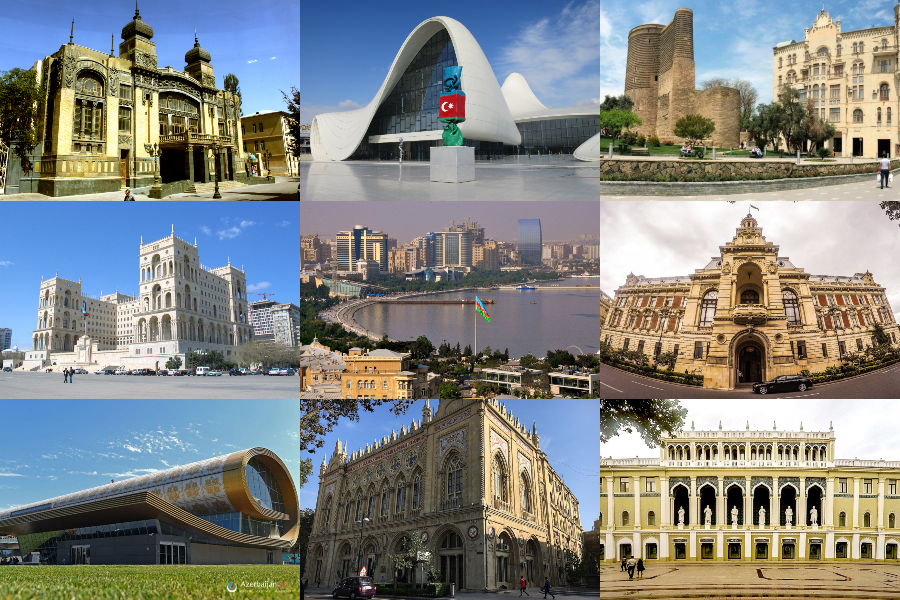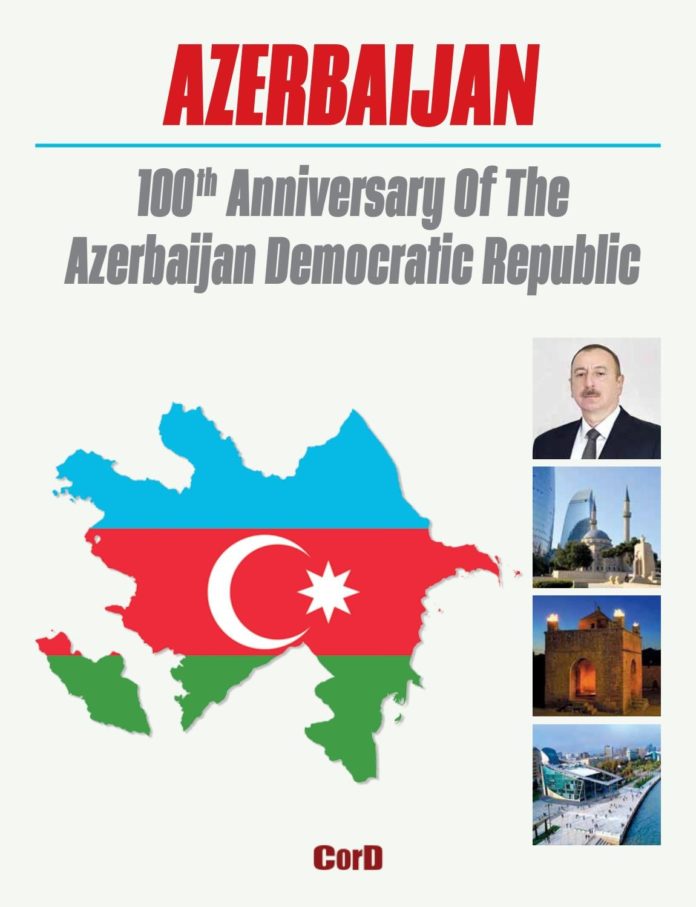Azerbaijan Democratic Republic (ADR) was a miracle in the regional history of South Caucasus which was achieved through constant political struggle and more importantly, peaceful means. ADR was the ultimate goal of Azerbaijani people to live with dignity and honor for which they had to suffer genocide from Armenia.
Opening of New Chapter
ADR opened a new chapter of nationalism, patriotism, free will and politicization and democratization process in the region. It was victory of Azerbaijani people against heinous crimes of Armenia. Last but not the least, it was established on the concept of development, diplomacy and dialogue whereas, Armenia stood for destruction, deadlock and demolition.
Great Political Reward
The Republic of Azerbaijan is the total sum of ADR political struggle, achievements in the fields of foreign policy, macro-economic policies, productive social development programs and tax reforms. Republic of Azerbaijan completes the dreams of the ADR for a qualitative life, of ethnic diversity, interfaith harmony and tolerance. Now Azerbaijan is a prosperous country which possesses 75 to 80 percent GDP of South Caucasus Region (SCR) and has become hub of regional connectivity, productivity and cultural affinity.
100th Anniversary of ADR
To celebrate the 100th anniversary of the Azerbaijan Democratic Republic (ADR), the President of Azerbaijan H.E. Ilham Aliyev declared 2018 as ‘Year of Azerbaijan Democratic Republic (ADR)‘. Azerbaijan Democratic Republic has multidimensional phenomena which was achieved through continuous political struggle, nationalism and national harmony of Azerbaijanis in the 19th century. The Azerbaijan Democratic Republic (ADR) was established on May 28, 1918, the first “parliamentary republic” in the entire Muslim world. It was created after the First World War and the collapse of the Tsarist Russian Empire.
Living Miracle
ADR was a great political, constitutional, social, moral and economical milestone in the national history of the Azerbaijan which was the first giant step towards achieving the desired goals of socio-economic prosperity and qualitative life. ADR has had strategic importance and utility, it changed its national, socio-economic, geopolitical and geostrategic history and created unshakeable national cohesion, societal harmony and political consensus which introduced a new model of governance in the country.
Giant Leap in Politicization & Democratization
The establishment of ADR brought further politicization and democratization in the country wherein concepts of equality, free will, and rights of common people, especially minorities were institutionalized. It facilitated the process of greater socio-economic prosperity, economic liberalization, and industrialization and tax reforms.
Rise to Commercial Diplomacy
The rule of law, rise of commercial diplomacy and ideas of diplomacy, dialogue and development were sustainably pursued which subsequently delivered unlimited dividends. Peaceful co-existence, interfaith harmony, women empowerment and human survival were maintained through collectivism. ADR also guaranteed national sovereignty and territorial integrity.
Economic Self Reliance
It promoted ideas of economic self-reliance, greater regional connectivity, and stable political system. It followed a balanced and development oriented foreign policy which enhanced its soft power image in the region and beyond which ultimately protected its national interests.
Important Organs of the State
ADR has various important organs of the state and functional parliament was one of them. It was the first in the Muslim world to extend suffrage to women, preceding the United Kingdom and the United States. Despite its short existence, ADR advocated and promoted the concepts of the rule of law, equality, personal liberties, multiculturalism, and secularism.
International Recognition
The formation of the ADR contributed a remarkable role in the subsequent approval of the country in the international arena. The Parliament of the ADR institutionalized “Azerbaijani statehood” and especially the “Parliamentary Culture” even before a century which is indeed a great political mileage. It proved that “human engineering” was a diehard spirit which even the most brutal colonial regimes and repressions were not able to destroy. The ideals of freedom and the traditions of state independence of the Azerbaijani people shone like a beacon.
Now, an independent and strong Azerbaijan is a worthy successor of the Azerbaijan Democratic Republic (ADR). It promoted and adopted principles and traditions of secularism. Regardless of religion, nationality and political view, all citizens of the newly proclaimed Republic had the same/equal rights. Formation of the ADR was a historic event which declared and afterwards, applied true spirits of democracy, a welfare state, humanity and above all ethnic diversification.
Somehow, it successfully combined European democratic values and the cultural heritage of the East in one political entity i.e. Azerbaijan Democratic Republic. It had western-style cabinet of ministers which ensured the full independence of the judiciary system and courts.

Birth of Modern Azerbaijan
The ADR was pioneer to witness a political and cultural leap of the Azerbaijani nation and led it along the path of freedom and progress. It developed the sovereign traditions of independent and modern Azerbaijan. It laid down the foundations of a law-governed state and created the conditions for a strong and articulated civil society. It achieved great success in various fields of politics, economy, military construction and culture. The declaration of the Azerbaijani language as the official language of the republic, the establishment of Baku State University, the formation of the national army and other security institutions and the emergence of an independent Azerbaijani political and economic line were some of the main achievements of the ADR.
Model of Good Governance
Due to successful model of good governance of the ADR modern Azerbaijan occupies a respectable position in the world community and in the family of civilized nations. H.E. Heydar Aliyev projected ADR as “a model for a new state and society which united organically the democratic values of Europe and the traditional characteristics of oriental culture.
Advocacy of National Interests
Right from the beginning the ADR had to face many problems but it managed to advocate the national interests and convinced the world community to support democratic principles and peaceful co-existence with all people and the states. Since its inception, the ADR government demonstrated its aspiration to be an integral part of the democratic world. The significant work of the ADR government left unforgettable traces in the history of Azerbaijan statehood and in the memory of the Azerbaijani people.
It was established a century ago and played an important role in the recognition of modern Azerbaijan as a democratic republic among the countries of the world. The Azerbaijan Democratic Republic was the first successful attempt to establish a democratic and secular republic in the entire Muslim world.
Role of ADR
The role of the ADR in the history of the statehood and socio-political thought of people is unimaginable. All citizens of the Azerbaijan Democratic Republic, regardless of their ethnic and religious affiliation, were granted the right to vote. ADR granted equal rights to all its citizens irrespective of social status, gender and religion. Reformist discourse reached its apex with the creation of the ADR. Upon its foundation, universal women’s suffrage was adopted two years before adoption in the United States, and a decade before the United Kingdom.
Formation of National Institutions
It achieved great success in the spheres of national army building, issuing national currency, establishing national bank, democratization, free elections, international relations and recognition of the independence of Azerbaijan by the international community. Furthermore, it secured the territorial integrity of Azerbaijan. It conducted diversified but integrated economic reforms which revolutionized its financial stability and socio-economic sustainability in the difficult times of weak economic conditions and financial shortcomings in the early days of the ADR.
Balanced & Pragmatic Foreign Policy
ADR followed a balanced and pragmatic foreign policy which guaranteed its national sovereignty and territorial integrity in its early days. It tried to build friendly ties with the regional countries, the cooperative relations with Georgia was one of the main successes of its foreign policy. Both countries agreed upon borders issues and the division of property. Both created a postal telegraph union and reached an agreement on tariffs and railroads. ADR and Georgia worked closely to promote greater cooperation in the Southern Caucasus despite Yerevan’s opposition.
Paris Peace Conference
Initially the ADR participated rigorously in the “Paris Peace Conference” in which it achieved a “De facto recognition” which paved to establish friendly and diplomatic ties with other European countries afterwards. A series of delegations were sent to many countries especially, Ottoman, European countries and the USA which ultimately brought dividends.
Golden Principles of Foreign Policy
It adopted three golden principles of a peaceful foreign policy consisting of diplomacy, dialogue and development which benefited it, while negotiating with Iran and regional countries. An ADR delegation visited Tehran in March 1919, the two sides agreed to hold a conference beginning in December 1919 which resulted in an accord on trade.
Diplomatic Ties
During the first 18 months of existence the ADR initiated concrete steps to establish diplomatic ties of various degrees of closeness with Georgia, Iran and Turkey. It set up consulates in Tabriz and five other cities in Iran, in Batumi in Georgia, in Crimea in Ukraine, and in Ashgabat in Turkmenistan. And on April 22, 1920, the ADR parliament adopted a law on the creation of diplomatic missions in the major countries of Europe, the United States, and Soviet Russia, even though it had not yet reached accord with these states. Moreover, the parliament voted to replace the diplomatic mission to the Paris Peace Conference at Versailles with missions to the governments of the countries that had taken part in the talks.
Unfortunately, The ADR did not survive too long and lasted only for 23 months when it was attacked by the Red Army of Soviet Russia. Physically the existence of the ADR was no more but “diehard spirit” of the ADR and its people never diminished rather it laid down the guidelines of Azerbaijani statehood, nationalism, diplomacy, dialogue, development, conflict resolution, foreign policy, peaceful co-existence, respect for ethnic diversification and the last but not the least, commercial diplomacy which are still very much relevant and effective in today’s world of economic national protectionism, globalization, sacristy of resources and looming danger of unilateralism and modern Azerbaijan learnt lessons of survival and prosperity from it.
ADR: A Spirit & Spiritual Entity
Establishment of Azerbaijan Democratic Republic in 1919 acted as a beacon of light for all Azerbaijanis which never left them in darkness always encouraged and motivated them to achieve the ultimate goal i.e. independence of freedom. Now all achievements in the fields of civility, politics, economics, development, national statehood, foreign policy and the last but not the least further, politicization and democratization are borrowed from the Azerbaijan Democratic Republic.

Giant Step
Existence of Azerbaijan Democratic Republic was a first giant step towards the realization of long awaited dreams of socio-economic prosperity, strengthening of national pride, protection of sovereignty and strong defense which is now reflected in the immense achievements of modern Republic of Azerbaijan which possess more than 75 percent of GDP of the South Caucasus.
Azerbaijan has now become connecting hub in the region which connects people, ideas, resources, minds, infrastructures and above all humanities which is the resultant/ apex of the Azerbaijan Democratic Republic.
Institutionalization of Policies & Programs
ADR initiated many short and long terms policies/programs/optics to secure its sovereignty and territorial integrity. The survival of ADR totally rested on its societal unity, economic viability, political stability and above strong defense in case of any internal or external aggression/attack. To minimize the chances of any misadventure from regional countries, the ADR followed zero interference in the affairs of other countries. The ADR also adopted peaceful foreign policy to resolve all the conflicts.
Main Aims
The main aim of the foreign policy of the Azerbaijan Democratic Republic was to promote newly established state. The new government, therefore, conducted an active foreign policy from its inception. Information was sent to a number of European countries about the establishment of the new state. The government signed a friendship treaty with the Ottoman Empire in Batumi.
With the passage of time ADR got familiarized among the European countries and succeeded in clinching vital support on different issues of economic productivity, national survival and greater connectivity. Especially central powers i.e. Germany, Austria-Hungary, the Ottoman Empire, and Bulgaria were starting to give importance to ADR. Moreover, rigorous participation in the “Paris Peace Conference” was the turning point in its foreign policy. The Azerbaijan issue was discussed at the Council of Allied Powers on 2 May 1919 for the first time. On 23 May 1919 a member of the British delegation, L. Mallet, met Topchubashov and they discussed political, military and economic issues. On 28 May Topchubashov met a member of the US delegation, Henry Morgenthau, during the first half of the day and President Woodrow Wilson during the second half.
The Azerbaijani parliament adopted a law on the establishment of diplomatic missions in the United Kingdom, France, Italy, the United States, Switzerland, Poland, Germany and Russia. Representative offices of the UK, Greece, Belgium, Georgia, Armenia, Denmark, Italy, Lithuania, Poland, Iran, USA, Ukraine, Finland, Sweden, Italy and Switzerland were opened in Baku.
The main purpose of the ADR delegation to Paris Peace Conference was to achieve worldwide recognition and unconditional independence of Azerbaijan Democratic Republic as a sovereign state. Due to rigorous efforts of the ADR’s delegation, the ADR was de facto recognized by the international community. In the history of Azerbaijani diplomacy ADR de facto recognition was important, in addition, in 1919, the ADR established ministry foreign affairs, and the day of its creation July 9, 1919 is now celebrated as the Day of the Diplomatic Worker.
ADR considered socio-economic development important for its survival and sustainability. For the first time it institutionalized the concepts of property pluralism, national bank, national currency, state budget, national market, foreign economic relations and economic management. It had flexible tax system which was instrumented to create business and investment environment in the country.
Property relations, agrarian issues, financial and monetary policy, foreign trade, economic relations, economic management system and tax practice was included in national economic model of Azerbaijan Democratic Republic. The ADR’s economic system was based on principles of “economic independence”, equality, productivity, optimal utility of available resources and the last but not the least, development of human capital which inspired/ motivated its rulers, decision makers and people to form a viable democratic society having social justice and equality among citizens and political parties alike.
The formation of Azerbaijan Democratic Republic (ADR) reflected unlimited human sacrifices, political struggles, social strengths and national services of its common people and leaders alike. Martyrs are still alive in shapes of Azerbaijan’s “irrevocable independence”, “uncompromising sovereignty”, “and sustained socio-economic prosperity” and the last but not the least, “unbending national pride”.




